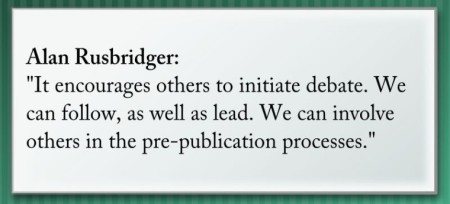Jay Rosen once said “The press does not ‘inform’ the public. It is ‘the public’ that ought to inform the press. The true subject matter of journalism is the conversation the public is having with itself.”
Check this interesting blog out on Open Journalism: https://greatdaytowrite.wordpress.com/2015/10/03/open-journalism-gotta-love-it-or-make-it-stop/
I think the conversation about whether or not news organisations are preventing open journalism is happening all around us. Its the role of a journalist to add to such conversations with facts, reporting, platforms and more. News organisations see that it is their role to lead or allow the conversation e.g. you may now comment on our story now that it is done. It’s an issue for public journalistic institutions such as BBC, News24 and other news organisations to limit comments on articles because they should be setting an example for other journalists and their sources. I don’t think news organisations understand that they can’t limit people from commenting on articles. They can’t only allow people who are anonymous to comment because everyone has the right to freedom of expression.
There are different platforms to publish your work with open journalism such as twitter, facebook, blogs and many more. The most popular platform is twitter, where people have the comfort to speak freely about anything. News organisations feel threatened by this as they attack critics for attacking their news organisations for limiting comments, but at the end of the day it’s the journalists responsibility to control this conversation.
The problem with comments is the context and the timing of the comments may be insulting to the public. What news organisations are saying is “We do not want to hear from you (the public) until we are done with our work.” All this is just a cycle, the public speaks, journalists do not listen, commenters get insulted, so they insult the journalists the journalists says that is proof of why comments are not worthy of any attention and the cycle goes on and on.
This article is a must read: http://www.poynter.org/news/mediawire/97416/racism-attacks-lead-news-sites-to-disable-story-comments/
Another reason why news organisations such as BBC limit comments is due to costs but collaboration is about sharing the work of journalism, it brings value and can save costs. It’s said that the public can’t provide real news or quality images so it makes sense for ‘polling’- which is an attempt to stimulate public opinion in order to prevent an authentic public opinion from forming (open journalism).
News now takes the structure of the internet. on one end it is the witness sharing and on the other end it’s readers interacting. No need for a central hub or a gatekeeper because the conversation is occurring on its own. Open Journalism adds value and it serves, but it should not think of itself as the creator of the conversation.
Here’s a Q&A about the future of open journalism by Alan Rusbridger: http://www.theguardian.com/commentisfree/2012/mar/25/alan-rusbridger-open-journalism
He also has an informative youtube video on the principles of open journalism: https://www.youtube.com/watch?v=Q8qN5Prlu-A

Very nice piece Boity. I appreciate the link too. You made some interesting points on the professional journalists perspective of this and how journalists need to take charge in the formation of news and not only rely on citizen journalists.
LikeLike
Actually she was pointing out that journalists need to rely on the public – the people formerly known as the audience – and not exclusively on themselves. Creating open forums like comments sections and using them appropriately is one way of doing this.
LikeLiked by 1 person